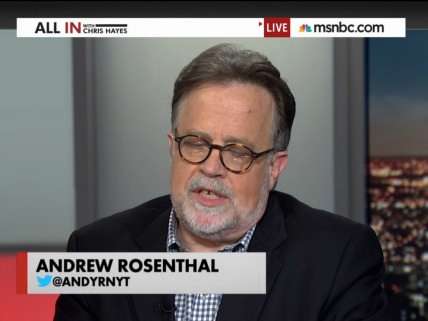After Rejecting Pot Prohibition, The New York Times Still Rejects Pot Smokers

Over the weekend, as you may have heard, The New York Times ran an editorial saying "the federal government should repeal the ban on marijuana." But as The Huffington Post's Michael Calderone pointed out on Sunday evening, the Times has not repealed its own ban on marijuana. To be more precise, it continues to insist that the urine of job applicants be free of marijuana metabolites, which indicate consumption of cannabis at some point in the recent past—anywhere from a few days to a few weeks earlier, depending on how frequently the source of the sample partakes. Metabolites do not measure impairment, and requiring applicants to pass a pre-employment drug test is not even an effective way to screen out pot smokers, since applicants generally have enough notice that they can abstain for a while, pass the test, and resume their habits afterward. New York Times Editorial Page Editor Andrew Rosenthal, for instance, told MSNBC's Chris Hayes that he passed his urine test in 1987. Who knows what Rosenthal has been up to since then?
More to the point, who cares? The main function of this excretory ritual is reinforcing the arbitrary distinctions drawn by our drug laws. But The New York Times has renounced those distinctions, at least with regard to marijuana, which it calls "far less dangerous than alcohol." So it is fair to ask why the Times is still pretending not to hire pot smokers when it has no issue with drinkers provided their alcohol consumption does not affect their work. "Our corporate policy on this issue reflects current law," a company spokeswoman told Calderone. "We aren't going to get into details beyond that." Contrary to the implication, the Times is not legally required to test aspiring reporters, editors, or photographers for marijuana. The company has the right to do so if it chooses, but that choice seems inconsistent with its rejection of pot prohibition and the prejudices underlying it.
Rosenthal told Hayes that Publisher Arthur Sulzberger had no problem with supporting legalization. "I think he'd probably been there before I was," Rosenthal said. Yet here is what Rosenthal had to say about the paper's drug testing policy: "Whether we're going to continue testing for marijuana or not, I don't know. If they ask me, I'll say, 'Stop.' But they won't."
A Change.org petition started by WeedMaps, the online dispensary directory, argues that the paper's business side should listen to Rosenthal:
The Times should bring its internal company policies into line with its views on the need to end legal discrimination against people who use marijuana. No one is saying that employers should be forced to deal with workers who are intoxicated at the office, but off-duty marijuana use doesn't negatively impact a journalist's ability to do his or her job. Traditional drug testing programs cannot determine whether someone is currently high; they merely test for metabolites that indicate whether someone used marijuana as far back as a month ago.
The Times should replace its outdated drug testing policy with a modern approach that focuses on impairment in the workplace, prioritizing job performance over the content of employees' urine. What journalists and other employees do on their own time is their own business. The Times doesn't concern itself with whether their writers have a drink after work. They should institute the same policy for marijuana.
As I noted a couple weeks ago, there is some evidence that employers in Colorado and Washington are moving in that direction. Testing companies are responding with drug screens that omit marijuana.
"If The New York Times believes it is wrong to discriminate against people for using marijuana," says Tom Angell of Marijuana Majority, "then they should stop doing so. Full stop. Forward-thinking companies in the emerging legal marijuana industry, such as WeedMaps, are leading the way toward a post-prohibition approach to hiring and human resources by focusing on job performance and not on the content of their employees' urine. The Times Company and other businesses in traditional sectors would do well to follow suit."


Show Comments (39)